Justification
ATC21S Field Test Phase 2.4 Memo.docx
NCES Cognitive, Pilot, and Field Test Studies System
Justification
OMB: 1850-0803
Memorandum United States Department of Education
Institute of Education Sciences
National Center for Education Statistics
|
DATE: November 1, 2011
TO: Shelly Martinez, OMB
FROM: Daniel McGrath, NCES
THROUGH: Kashka Kubzdela, NCES
SUBJECT: ATC21S: US National Feasibility Test (OMB# 1850-0803 v.59)
Submitted-Related Information
The following material is being submitted under the National Center for Education Statistics (NCES) clearance agreement (OMB #1850-0803), which provides for NCES to improve methodologies, question types, and/or delivery methods of its survey and assessment instruments by conducting field tests, focus groups, and cognitive interviews. The request for approval described in this memorandum is to conduct the fourth and final phase of development and field-testing of assessment tasks of 21st century skills for 6th, 8th, and 10th grade students. The four phases of the field test include task validation of the assessment prototype, cognitive labs, a pilot test, and a field test. Attached to this memo please also find Appendix A with the Phase 2.4 field test training and administration materials.
Background
The Assessment and Teaching of 21st Century Skills (ATC21S) project is focused on defining what are considered to be 21st century skills. The two areas to be developed are literacy in information and computer technology (ICT) and collaborative problem solving - areas that are thought to play an important role in students’ preparation for 21st century work places. The project is coordinated by Cisco Systems Inc., Intel Corporation, and Microsoft Corp and led by representatives of six “Founder” countries that have agreed to test the assessments developed in the ATC21S project: Australia, Finland, Portugal, Singapore, the United Kingdom, and the United States. Three associated countries, Costa Rica, the Netherlands, and Russia, have recently joined the project.
In 2009, ATC21S convened five working groups of experts to review the state-of-the-art and develop key issues to be resolved in conceptualizing the domain of 21st century skills; developing methodology and technology for assessing these skills; understanding the relationship between these skills, instruction, and other learning opportunities; and developing a policy framework for implementing assessments of the skills. Short descriptions of the resulting five White Papers, designed to inform the future stages of the project, were provided in the clearance package for ATC21S cognitive interviews (OMB# 1850-0803 v.41), approved on February 23, 2011.
In 2010, the ATC21S Executive Board (made up of senior officials from each of the founder countries and representatives from Cisco, Intel, and Microsoft) approved a focus on two 21st century skill domains promising for measurement: (1) Collaborative Problem Solving and (2) ICT Literacy – Learning in Digital Communities. Panels of experts were convened to define the constructs to be measured. Both panels focused on the theoretical framework for their domain and proposed a series of proficiency levels to guide assessment task developers in the next phase of the project.
The Collaborative Problem Solving panel, under the leadership of Professor Friedrich Hesse (University of Tubingen/Knowledge Media Research Center, Germany) and Professor Eckhard Klieme (German Institute for International Educational Research), defined the construct of collaborative problem solving. The ICT Literacy – Learning in Digital Communities panel under the leadership of Dr. John Ainley (Australian Council for Educational Research, Australia) defined the construct of digital literacy and social networking. Both panels focused on the theoretical framework for their domain and proposed a series of proficiency levels to guide assessment task developers in the next phase of the project.
Web-based assessments designed to measure literacy in information and communication technology (ICT) were developed in draft form in the United States and assessments to measure the collaborative problem solving were developed in draft form in the United Kingdom. The development work is funded by the Cisco, Intel, and Microsoft consortium under a separate contract.
The end products of web-based assessments and supporting strategies will be made available in the public domain for classroom use. NCES plans to use the web-based assessments in development of items for its longitudinal surveys, international assessments, and, potentially, NAEP.
Design and Context
NCES has contracted WestEd (henceforth, the contractor) to implement all phases of the U.S. National Feasibility Test project. Specifically, the contractor has been working with the two development contractors, the Berkeley Evaluation and Assessment Research (BEAR) Center at the University of California, Berkeley, and World Class Arena Ltd. in the UK to test the ICT Literacy and Collaborative Problem Solving assessments in the field through different phases of implementation and report on the findings. The findings will be used to further refine the assessments until a final version is achieved. Eugene Owen and Dan McGrath are the project leads at NCES.
Phases completed to date.
2.1 Phase – Validation of the task concepts was completed on October 28, 2010. WestEd validated the ICT Literacy tasks with 9 teachers (3 at 6th grade, 3 at 8th grade, and 3 at 10th grade). Teacher’s provided WestEd with feedback on the task concepts as they related to the grade levels they taught.
2.2 Phase – Cognitive Lab think aloud sessions (approved on February 23, 2011, OMB# 1850-0803 v.41) were completed on March 31, 2011. The contractor observed a series of individual students as they worked through each of the ICT Literacy prototype tasks, and collected meta-cognitive data during the process. Twenty-one students from the 6th, 8th, and 10th grades participated. The Collaborative Problem solving assessments were not included in the US cognitive lab sessions because these assessments were not available at the time. The Collaborative Problem Solving tasks were used in cognitive labs in other partner countries in the project.
2.3 Phase –The Pilot Test (approved on May 25, 2011, OMB# 1850-0803 v.49) was administered in schools in California in September 2011. The Pilot Test involved the administration of the ICT Literacy tasks in the classrooms of three teachers, one teacher for each grade level (6th, 8th, and 10th grades). Approximately 112 students participated in the pilot (23 students in grade 6; 40 students in grade 8; and 49 students in grade 10). The pilot test produced a data set comprised of the student actions and responses in each of the assessment tasks within the ICT Literacy scenarios, including data on how effectively the assessments measure the targeted skills; the feasibility of administering web-based assessments in a school setting; and the data capture and measurement methods involved in interpreting the complex responses that these types of assessment generate. The three teachers were trained to administer the assessment to their classes. Training was conducted online using webinar software so that the contractor could walk the teachers through the administration process. The Webinar training took approximately one-hour. Teachers reserved school computer rooms for the administration. Teachers had to conduct an accessibility test on all student computers prior to the pilot to make sure the computers were able to access web sites and to check upload and download speeds. Personnel from UC Berkeley provided logins and passwords for all students in the pilot test and the teachers also made sure that student logins were set up prior to the administration. Most students completed Webspiration and Arctic Trek. School district offices blocked the web site Chatzy for liability reasons. The Chatzy web site is needed for administration of the Second Language Chat. As a result of the pilot test, the Second Language Chat will not be administered in the field trials.
Phase for which OMB approval will be sought
2.4 Phase – Approval is now sought for administration of the field trials. (Recruitment for the field trials was approved on May 25, 2011, OMB# 1850-0803 v.49.) The field trials will take place in mid-November through December 2011. The field trials are designed to provide sufficient data to establish empirically based scales that have the capacity to indicate students’ place and progress on developmental continua associated with each of the 21st century skill sets assessed. The US sample is a part of an overall sampling design that spans all of the countries participating in the field trials phase of the project and will involve field-testing of tasks from both the ICT Literacy and Collaborative Problem Solving domains. Students will take three 45-minute tasks (two from one strand and one from the other) so that psychometric equating of task difficulty and scaling of performances across domains can be achieved. Table 1 below shows the strand of ICT Literacy Tasks. Table 2 shows the strand of Collaborative Problem Solving Tasks.
Table 1: ICT Literacy Task Strand
Task |
Time |
Task Labels |
|||
|
11 YR |
13 YR |
15 YR |
||
Webspiration |
45 min |
11 |
X |
|
|
Webspiration |
45 min |
13 |
|
X |
|
Webspiration |
45 min |
15 |
|
|
X |
Arctic Trek |
45 min |
11 |
X |
|
|
Arctic Trek |
45 min |
13 |
|
X |
|
Arctic Trek |
45 min |
15 |
|
|
X |
Table 2: Collaborative Problem Solving Task Strand
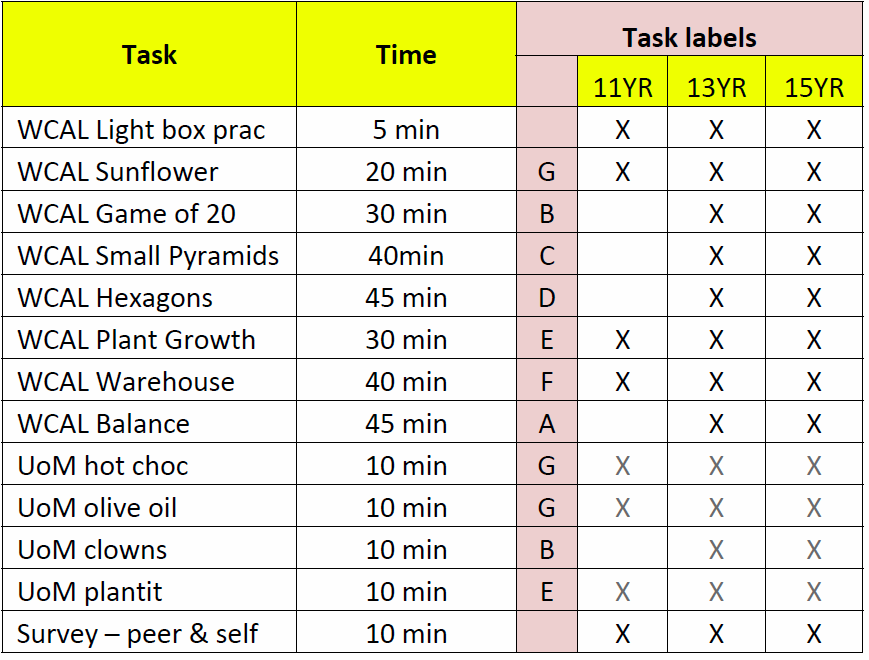
The Collaborative Problem Solving Tasks are identified as A, B, C, D, E, F, and G in Table 2 above. They are shorter tasks bundled into one 40-45-minute session. For example, if a student were assigned “Bundle B”, they would take WCAL Game of 20 (30 minutes) and UoM Clowns (10 minutes) to create a 40-minute session. The ICT Literacy Tasks are single 45-minute tasks. Students will be assigned two 45-minute ICT tasks and one 45-minute bundle of Collaborative Problem Solving tasks.
During the field trials, the administration of the tasks will be fully automated, and should not require teacher input apart from their fulfilling a supervisory role during the administration. A web-based delivery system will deliver the assessments. Training of teachers will be conducted online using webinar software so that the contractor can walk the teachers through the administration process. Prior to the training session, teachers will receive the ICT Literacy Administration Manual and the Collaborative Problem Solving Administration Manual (both can be found in Appendix A). Teachers will reserve school computer rooms for the administration, talk with the school computer network support person to ensure that the computers meet the minimum requirements for the administration, and make sure that student logins are set up prior to the administration. The assessments will be administered in three 45-minute class periods. An estimated 25 students per each of the 21 teachers (total 525 students) from the U.S. will take the assessments. Student responses will be recorded and stored electronically for analysis of the whole data set. Teachers will receive $200 for their participation, training, assessment administration, and fulfilling the role of school coordinator.
Overview of the Assessment Tasks
Two types of tasks will be administered during the field trials in mid-November through December 2011. They include:
Information and Communications Technology (ICT) Literacy 21st Century Skills Tasks
Collaborative Problem Solving Tasks
Information and Communications Technology (ICT) Literacy 21st Century Skills Tasks
Two tasks will be administered during the field trials to assess the Information and Communications Technology (ICT) Literacy 21st Century Skills. These tasks include:
• Webspiration – set in the context of a poetry-based environment
• Arctic Trek – set in the context of a natural adventure-based environment
Although the ICT tasks are set in scenarios that relate to typical content areas such as English Language Arts, Science, Mathematics, and Technology, the task focuses on the assessment of ICT literacy skills. The ICT Literacy skills domain is broken out in the assessment into four sub-domains:
• Functioning as a consumer in networks
• Functioning as a producer in networks
• Participating in the development of social capital through networks
• Participating in intellectual capital (collective intelligence) in networks
Webspiration
Webspiration will involve students in articulating the moods and meanings of grade-level appropriate poems. Students will use Webspiration, a concept-mapping tool, to formulate their own ideas on the poems, to create an idea map collaboratively, and to analyze each poem they read. Students will submit their own ideas or build on classmates’ thoughts. Some of the ICT skills to be assessed in this task include:
• Using a computer interface
• Performing basic IT tasks
• Searching for pieces of information using common search engines
• Producing simple representations from templates
• Reading and interpreting simple displays
• Starting an identity
• Logging into an external website
• Posting an artifact
• Participating in a social activity online
• Making tags
• Posting or answering questions
Figures 1 through 8 show screen shots from Webspiration.
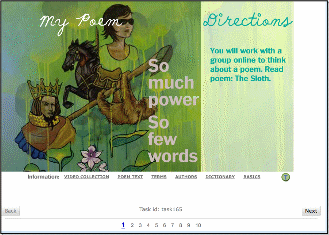
Figure 1: Opening screen introducing students to the appropriate poem for their grade level
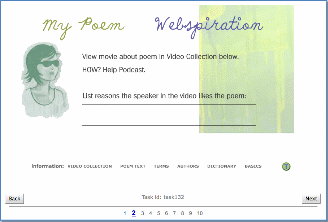
Figure 2: Students watch a video of someone reading the poem and respond to a prompt
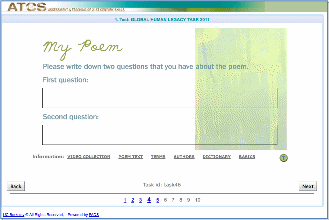
Figure 3: Students write questions about the poem
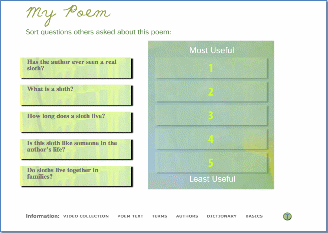
Figure 4: Students sort questions about the poem
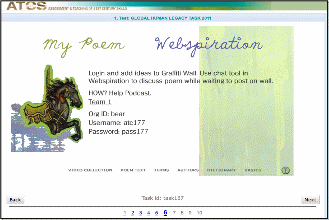
Figure 5: Students login to collaborate with their team
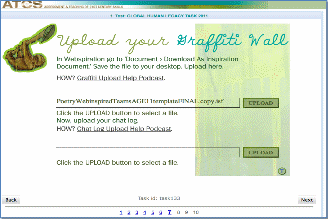
Figure 6: Students upload a document related to their poem
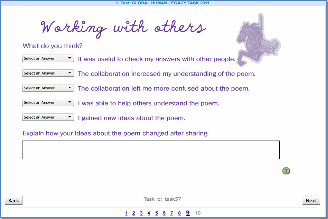
Figure 7: Students evaluate working with their team
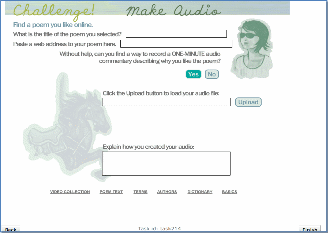
Figure 8: Students find a poem they like online and paste in the web address
Arctic Trek
The Arctic Trek task will engage students in a collaboration contest or virtual treasure hunt. The Arctic Trek task views social networks through ICT as an aggregation of different tools, resources, and people that together build community in areas of interest. In this task, students will work in small teams to unravel clues, while touring through the scientific and mathematics expeditions of actual scientists.
Figures 9 through 16 show screen shots from Arctic Trek.
|
|
Figure 9: Opening screen introducing students to task
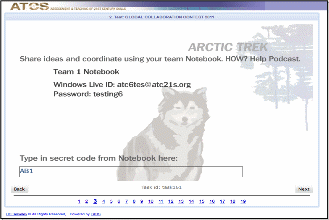
Figure 10: Screen instructing students to join their team
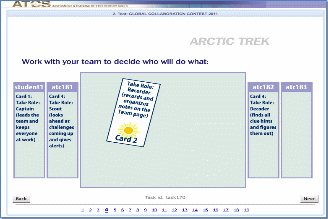
Figure 11: Screen instructing students to self-assign roles
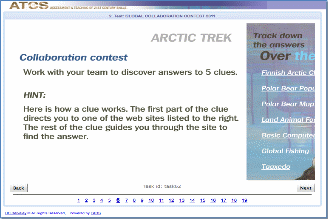
Figure 12: Screen instructing students how to use clues to work through the task
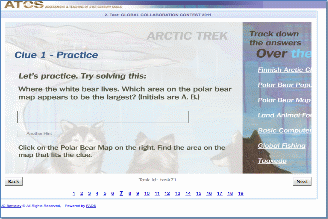
Figure 13: Screen providing opportunity to practice using links to find information
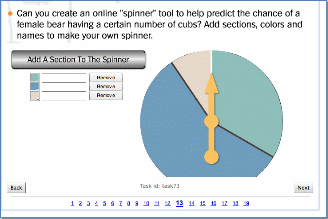
Figure 14: Screen instructing students to use data from a previous screen to create a spinner
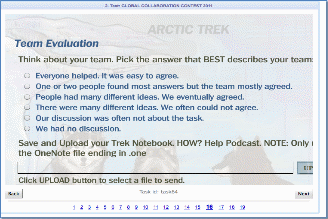
Figure 15: Screen instructing students to evaluate group collaboration
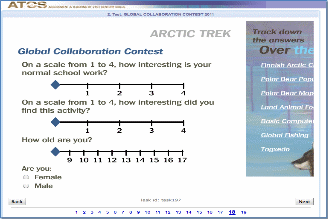
Figure 16: Screen show students rating their interest in the task
Collaborative Problem Solving Tasks
The Collaborative Problem Solving Skills to be administered during the field trials will measure constructs in: (1) social skills, including participation, perspective taking, and social regulation; and (2) cognitive skills, including task regulation and knowledge building. Table 3 below shows the tasks that will be administered during the field trials. Students will work with a partner to solve the same problem using different pieces of information. Students must communicate via a chat space to share information to solve the problem within a designated period of time.
Table 3: Collaborative Probe Solving Tasks
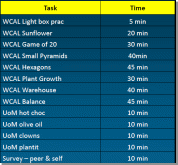
Figures 23 through 28 show examples of the Collaborative Problem Solving tasks.
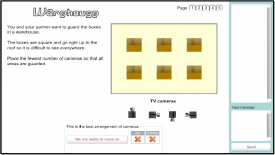
Figure 23: WCAL Warehouse—students collaborate on the placement of cameras to secure a warehouse
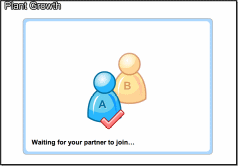
Figure 24: UoM Plant Growth—students log on to the task as partners
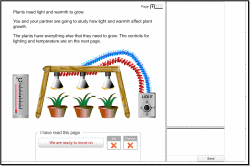
Figure 25: UoM Plant Growth—students collaborate on the amount of light and temperature needed for plant growth
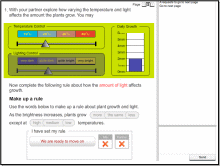
Figure 26: UoM Plant Growth—students see different information—e.g., one student will be able to control the amount of light
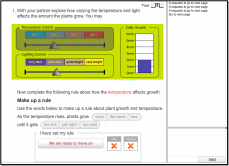
Figure 27: UoM Plant Growth—students see different information—e.g., another student will be able to control temperature
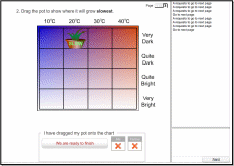
Figure 28: UoM Plant Growth—although students see different pieces of information, they must collaborate through a chat space to organize their findings on a graph
Final Report
The ACT21S project has been extended through July 2012. The project was originally intended to end by December 31, 2011. The contractor will produce and deliver a written report summarizing the project, the activities, and the findings by July 31, 2012.
Use of Results
The field test will provide data on the feasibility of the assessments being administered in school settings, on data collection being carried out through the test administration system, and will allow for calibration of the scales used to measure the skills. A data set will be collected. All personally identifying information will be removed.
End products of the overall project will be made publicly available for use in classrooms and will be used by NCES for the development of assessment tasks in its longitudinal studies, international assessments, and, potentially, NAEP.
Results and data from the field trials will be compiled by the contractor and provided in usable form to NCES and to the international researcher coordinator. NCES will provide direction through the international research coordinator.
Assurance of Confidentiality
Field Trial teacher participants are asked to sign (1) a Teacher Consent form provided by the contractor as a condition of participation. Principals are asked to sign (2) a Principal Consent Form and to sign (3) a Memorandum of Understanding for school participation. Teachers are provided with (4) a Parental Opt Out form so that parents can have the option of having their child’s data removed from field trial results. These four forms were submitted with the OMB memorandum on May 2, 2011 and approved on May 25, 2011. Student response data will be de-identified through the use of unique ID numbers so that individual students cannot be identified in the data set collected for analysis. Additionally, WestEd staff working on the project sign the NCES Affidavit of Nondisclosure.
Students will be reminded before they begin the assessment that they will not receive a grade for taking the computer-based assessment tasks; that the tasks are being field tested to see how well these tasks work, that the performance of the students is not being evaluated, that their names will not be associated with the assessments’ results, that no identifying information will be recorded, and all information collected will be used only for statistical purposes.
Project Schedule
2011 2012
Remaining Tasks
|
Aug |
Sept |
Oct |
Nov |
Dec |
Jan |
Feb |
Mar |
Apr |
May |
Jun |
Jul |
Run ICT Pilot Test
|
|
|
|
|
|
|
|
|
|
|
|
|
(Production of Field Test version of ICT/CPS)
|
|
|
|
|
|
|
|
|
|
|
|
|
Prep OMB pack for Field Test
|
|
|
|
|
|
|
|
|
|
|
|
|
Recruit for Field Test
|
|
|
|
|
|
|
|
|
|
|
|
|
Run Field Test
|
|
|
|
|
|
|
|
|
|
|
|
|
Produce final report
|
|
|
|
|
|
|
|
|
|
|
|
|
Estimate of Hour Burden
A purposive sample of teachers and schools across the United States will be recruited to participate in the field trials. While the sample will not be a nationally representative sample, the study will attempt to recruit from all regions of the country and include urban, suburban, and rural schools. For example, the contractor will conduct recruitments in Washington, California, Colorado, Texas, Chicago, Florida, District of Columbia, New York City, and New England. Participants will include seven 6th grade teachers, seven 8th grade teachers, and seven 10th grade teachers. Once recruited, teachers and schools will complete and submit consent forms and confirm technology requirements with the school computer network support expert (see Appendix A). All teachers will schedule and participate in a web-based training session and will be provided student logins and passwords for the testing sessions. All teachers will also conduct accessibility testing on school computers. Schools will be provided a testing window and teachers will administer the three 45-minute tasks in one day or over a two-week period.
Burden Table for Phase 2.4 Field Trials (assessment administration)
Activity |
Number of Respondents |
Number of Responses |
Estimated Hours |
TOTAL Burden Hours |
Teacher computer accessibility testing |
21 teachers |
21 |
2 |
42 |
Teacher training |
21 teachers |
21 |
1 |
21 |
Teacher administration of the field test |
21 teachers |
21 |
3 |
63 |
Total |
21 |
63 |
|
126 |
Cost to the Federal Government
Phase 2.2, Cognitive Labs & Phase 2.3, Pilot Test |
$127,741 |
Phase 2.4, Field Test |
$75,201 |
Final Report |
$32,185 |
ATC21S
| File Type | application/vnd.openxmlformats-officedocument.wordprocessingml.document |
| Author | Mike Timms |
| File Modified | 0000-00-00 |
| File Created | 2021-01-31 |
© 2026 OMB.report | Privacy Policy
